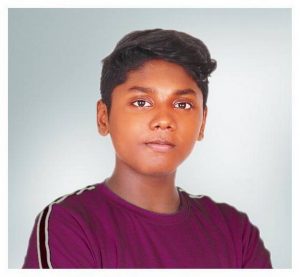 Aditya K. of Kozhikode, Kerala has become the first child from the State to bag the Bharat Award for bravery. The most prestigious of the National Bravery Awards, given away by the Indian Council for Child Welfare. The Bharat Award has gone to Aditya for rescued 20 people from a bus carrying members of the Calicut University Pensioners’ Forum and their families when it caught fire coming down a steep mountain road. Two more children from the State are also recipients of the awards. Muhammed Mohsin has been given the award posthumously for saving the lives of three children. Fatah gets the award for rescuing a woman and a girl from an approaching train. Both belong to Kozhikode. Aditya K. of Kozhikode, Kerala has become the first child from the State to bag the Bharat Award for bravery. The most prestigious of the National Bravery Awards, given away by the Indian Council for Child Welfare. The Bharat Award has gone to Aditya for rescued 20 people from a bus carrying members of the Calicut University Pensioners’ Forum and their families when it caught fire coming down a steep mountain road. Two more children from the State are also recipients of the awards. Muhammed Mohsin has been given the award posthumously for saving the lives of three children. Fatah gets the award for rescuing a woman and a girl from an approaching train. Both belong to Kozhikode. |
| Source: The Hindu |
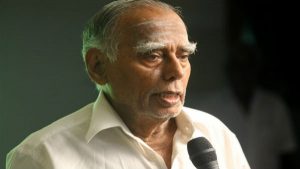 Noted archaeologist R. Nagaswamy was honoured at the Silver Jubilee International Conference of Art in Dhaka by Bangladesh. He is an Indian historian, archaeologist and epigraphist. He served as the founder-director of Tamilnadu Archaeology Department. In 2018 he was awarded India’s third highest civilian award Padma Bhushan. Noted archaeologist R. Nagaswamy was honoured at the Silver Jubilee International Conference of Art in Dhaka by Bangladesh. He is an Indian historian, archaeologist and epigraphist. He served as the founder-director of Tamilnadu Archaeology Department. In 2018 he was awarded India’s third highest civilian award Padma Bhushan. |
| Source: The News on AIR |
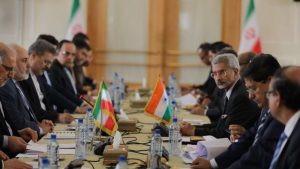 External Affairs Minister S Jaishankar co-chaired the 19th Joint Commission meeting with Foreign Minister of Iran. The Joint Commission meeting was held in Tehran, Iran. The meeting reviewed the entire gamut of the cooperation and agreed to accelerate work on the strategic Chabahar project. The Chabahar port is jointly being developed by India, Iran and Afghanistan. It is located on the Indian Ocean in the Sistan and Baluchestan province of Iran. External Affairs Minister S Jaishankar co-chaired the 19th Joint Commission meeting with Foreign Minister of Iran. The Joint Commission meeting was held in Tehran, Iran. The meeting reviewed the entire gamut of the cooperation and agreed to accelerate work on the strategic Chabahar project. The Chabahar port is jointly being developed by India, Iran and Afghanistan. It is located on the Indian Ocean in the Sistan and Baluchestan province of Iran. |
| Source: The Business Standard |
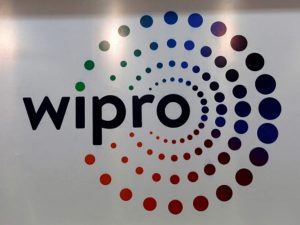 Wipro has partnered with Nasscom to train students on emerging technologies. The programme will train on technologies such as artificial intelligence, data science, internet of things, cybersecurity. Wipro will train 10,000 students from engineering colleges in India as a part of Wipro’s corporate social responsibility programme “TalentNext“. TalentNext aims to improve the quality of engineering education by preparing faculty and academic leaders to train students. The programme will now be extended to students directly through Future Skills, a Nasscom platform. “Future Skills” bridges the industry-academia skill gap and help students learn new-age technologies. Wipro has partnered with Nasscom to train students on emerging technologies. The programme will train on technologies such as artificial intelligence, data science, internet of things, cybersecurity. Wipro will train 10,000 students from engineering colleges in India as a part of Wipro’s corporate social responsibility programme “TalentNext“. TalentNext aims to improve the quality of engineering education by preparing faculty and academic leaders to train students. The programme will now be extended to students directly through Future Skills, a Nasscom platform. “Future Skills” bridges the industry-academia skill gap and help students learn new-age technologies. |
| Source: The Economic Times |
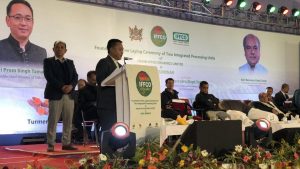 Chief Minister, Sikkim laid the foundation stone of two Integrated Organic Food Processing units of Sikkim IFFCO Organics Ltd. in Rangpo, East Sikkim. Sikkim IFFCO Organics Limited is a joint venture between the world’s biggest fertilizer Cooperative, IFFCO and Government of Sikkim. Its aim is to promote and market the organic produce of the country and especially from Sikkim and other north-eastern states of India. The major commercial crops in which Sikkim IFFCO will operate are ginger, turmeric, large cardamom and buckwheat. Chief Minister, Sikkim laid the foundation stone of two Integrated Organic Food Processing units of Sikkim IFFCO Organics Ltd. in Rangpo, East Sikkim. Sikkim IFFCO Organics Limited is a joint venture between the world’s biggest fertilizer Cooperative, IFFCO and Government of Sikkim. Its aim is to promote and market the organic produce of the country and especially from Sikkim and other north-eastern states of India. The major commercial crops in which Sikkim IFFCO will operate are ginger, turmeric, large cardamom and buckwheat. |
| Source: The News on AIR |
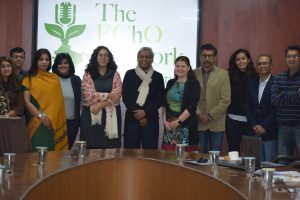 Prof. Krishnasamy VijayRaghavan, Principal Scientific Adviser to the Govt of India launched a national program called “EChO Network” in New Delhi. The EChO network provides a template for cross-disciplinary leadership in India. The purpose of this programme is to bring citizens, govt etc to solve problems in the areas of research knowledge, and awareness of Indian ecology and the environment. Prof. Krishnasamy VijayRaghavan, Principal Scientific Adviser to the Govt of India launched a national program called “EChO Network” in New Delhi. The EChO network provides a template for cross-disciplinary leadership in India. The purpose of this programme is to bring citizens, govt etc to solve problems in the areas of research knowledge, and awareness of Indian ecology and the environment. |
| Source: The News on AIR |
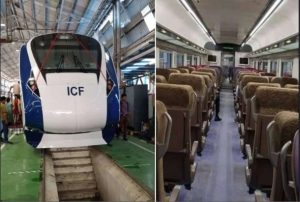 Integral Coach Factory (ICF) of Indian Railways has produced its 3000 Coaches in record 215 days. The 64-year-old production unit beat its own record by reducing the number of working days to achieve the target of making 3,000 coaches in 289 days in 2018-19 to 215 days this year and retained its position as the largest coach- maker in the world. Integral Coach Factory (ICF) of Indian Railways has produced its 3000 Coaches in record 215 days. The 64-year-old production unit beat its own record by reducing the number of working days to achieve the target of making 3,000 coaches in 289 days in 2018-19 to 215 days this year and retained its position as the largest coach- maker in the world. |
| Source: The Hindu |
 On December 23, 2019, the department of fisheries (GoI), NABARD and Tamil Nadu Government signed an agreement to implement Fisheries and Aquaculture Development Fund (FIDF). The tripartite agreement set a total of Rs 7522 crores to address the infrastructure requirement of fisheries sector. On December 23, 2019, the department of fisheries (GoI), NABARD and Tamil Nadu Government signed an agreement to implement Fisheries and Aquaculture Development Fund (FIDF). The tripartite agreement set a total of Rs 7522 crores to address the infrastructure requirement of fisheries sector. |
| Highlights The fund includes setting up of berth facilities for safe landing for number of fishing vessels. It will also be used to increase fish production, stimulate fisheries related economic activities, and to boost economic activities in the region. The projects are to be implemented in the southern coasts of Tamil Nadu. The funding will also be used to augment deep sea fishing, cage culture and promote exports in the future. |
| Role of NABARD NABARD provides concessional financing to fisheries infrastructure facilities through state governments under FIDF. It is the Nodal Loaning Entity of the fisheries department. It also supports fisheries under Rural Infrastructure Development Fund (RIDF) |
| Fisheries in Tamil Nadu Tamil Nadu is the home of 10 lakh fisher families. The state is ideal for brackish water fisheries, marine fisheries and inland fisheries. Tamil Nadu ranks fourth in total fish production in the country. India ranks second in the world fish production. The fisheries sector in the country contributes to 1% of GDP of the country. |
 The Quality Council of India (QCI) recently released its survey on imported toys. According to the report, 66.9% of the toys failed the test. The Quality Council of India (QCI) recently released its survey on imported toys. According to the report, 66.9% of the toys failed the test. |
| Highlights The QCI conducted the testing on toys that were available in the Delhi markets and in the National Capital Region. Around 121 varieties were procured and submitted to NABL (National Accreditation Board for Testing and calibration Laboratories). Of the tested varieties, 30% of the plastic toys failed to meet the tests of permissible level of phthalate, heavy metals, etc. Around 80% of the toys failed to meet the physical and mechanical safety properties. In the soft toys, 45% failed on phthalate test and 75% failed on tests conducted on mechanical properties. Of the toys sold in Delhi markets, 85% are from China, followed by Sri Lanka, Malaysia and Germany. |
| Quality Council of India The QCI was set up in 1997 to establish and promote quality standards across social and economic sectors. The services offered by QCI include quality assessment, accreditation services, quality promotion, etc. It is associated with CII (Confederation of India Industry), ASSOCHAM (where PM Modi addressed its 100th year celebrations). The Council is governed by 38-members. The chairperson of the council is appointed by the PM of India. It functions through 5 main accreditation boards namely NABCB (National Accreditation Board for Certification Bodies), NABET (National Accreditation Board for Education and Training), NBQP (National Board for Quality Promotion), NABH (National Accreditation Board for Hospitals and Healthcare Providers) and NABL. |
 Health officials in Eastern Congo recently documented the first relapse of current Ebola epidemic. The Ebola outbreak in Democratic Republic of Congo (DRC) has so far infected more than 3,300 people and killed more than 2,200 since the middle of 2018, making it the second-worst on record. According to World Health Organisation (WHO), this recent relapse happened in Aloya district where a motorcycle taxi operator is said to have come into contact with 33 people is potentially the cause of 11 new confirmed Ebola cases in past week. Health officials in Eastern Congo recently documented the first relapse of current Ebola epidemic. The Ebola outbreak in Democratic Republic of Congo (DRC) has so far infected more than 3,300 people and killed more than 2,200 since the middle of 2018, making it the second-worst on record. According to World Health Organisation (WHO), this recent relapse happened in Aloya district where a motorcycle taxi operator is said to have come into contact with 33 people is potentially the cause of 11 new confirmed Ebola cases in past week. |
| What is Ebola? Ebola is a rare but deadly virus which was first identified in 1976 by researchers sent to investigate an ailment that was killing victims in a remote part of Democratic Republic of Congo (DRC). The researchers team named the condition after the local Ebola river. Ebola causes Ebola Virus Disease (EVD), a rare and deadly disease in people and nonhuman primates. Ebola is triggered by a virus- probably picked up from an infected bat or non-human primate – that causes blood vessels to leak and can end in organ failure and death. Ebola has killed more than 11,000 people between 2013 and 2016. |
You need to login to perform this action.
You will be redirected in
3 sec
